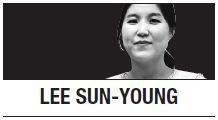Lawmakers grilling President Moon Jae-in’s Cabinet nominees during parliamentary confirmation hearings are complaining about receiving an avalanche of text messages -- most of them containing scathing criticism of the recipients on their performance during the televised and livestreamed sessions.
Rep. Lee Un-ju of the People’s Party revealed late last month that she had to change her phone number after getting nearly 10,000 such messages in the space of just two days. She had been particularly harsh on Prime Minister Lee Nak-yon during his confirmation process, likening the veteran politician to an “unsellable product.”
Rep. Lee’s party has rolled up its sleeves against “text bombs,” calling it a serious threat to parliamentary democracy. Its recently formed task force is headed by a former senior prosecutor.
Other opposition parties have joined in, proclaiming text bombing as an act of terrorism and threatening to take legal action against those who used insulting language.
While the use of abusive or menacing language and inappropriate timing should be condemned and restrained, I advise politicians annoyed by a sudden surge of direct feedback to try to get used to the new political reality.
To me, text bombs seem to be part of a bigger trend toward interactive or responsive politics.
Signs have been pretty clear that we are entering a different political world, where communication is, far more often, two-way -- as it has been the norm in most other fields for a long time.
This past winter, amid the shocking unraveling of the scandal surrounding President Park Geun-hye, South Korea saw a surge of petty political donations, not to lend support to, but to condemn the recipient lawmakers. The donations were all in identical amounts of 18 won (less than 2 cents). (In Korean language, the number 18 is a homophone of a curse word.)
In spring, during the presidential election season, President Moon Jae-in, then a leading candidate, collected over 125,000 text messages from voters making policy suggestions for 44 days after disclosing his phone number, created specifically for the given project, to the public. The messages have become the basis for selecting Moon’s top 10 campaign pledges, pushing issues like fighting the country’s worsening air quality higher up on the priority list.
Even today, the president’s de facto transition team is soliciting the public’s views on the new administration’s policy plans unveiled so far through text messages.
As professor Kang Won-taek of Seoul National University has rightly pointed out in a local journal, it is now time that the political establishment wakes up to a new reality in which the public desire for “Korean democracy version 2” is reaching boiling point.
“It is time that South Korea moves on from the political system laid out by the 1987 Constitution and deepens its democracy. To forge a new pact, however, the politicians should break away from their old patterns of dialogue and embrace open and participatory ways,” the politics professor wrote.
People have become conscious of their power after removing a sitting president from office with a peaceful grassroots rebellion. People are politically activated, engaged and interactive. And now, they want their elected representatives to be more responsive.
What’s new in the so-called text bombing phenomenon is the discovery of texting as a powerful medium of political expression. Perhaps too powerful that it invokes such visceral reactions from the recipients.
Unlike email, social media feeds or blog posts, text messages are personal, one-on-one and hard to ignore. We can shut ourselves off from spam emails, regardless of their volume or malicious content. But text messages grab our attention through mobile phones, essential for both personal and official communication in South Korea.
So, senders be more cautious, more polite, and try to master the art of “political texting” to make your elected representatives more responsive.
---
By Lee Sun-young
Lee Sun-young is the national desk editor of The Korea Herald. She can be reached at
milaya@heraldcorp.com. -- Ed.






![[Herald Interview] 'Trump will use tariffs as first line of defense for American manufacturing'](http://res.heraldm.com/phpwas/restmb_idxmake.php?idx=644&simg=/content/image/2024/11/26/20241126050017_0.jpg)
![[Exclusive] Hyundai Mobis eyes closer ties with BYD](http://res.heraldm.com/phpwas/restmb_idxmake.php?idx=644&simg=/content/image/2024/11/25/20241125050044_0.jpg)
